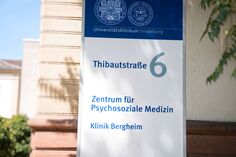NEURAL CORRELATES OF VERBAL AUDITORY HALLUCINATIONS IN PATIENTS WITH BORDERLINE PERSONALITY DISORDER
COGNITIVE NEUROPSYCHIATRY SECTION
Staff
Dr. med. Viviane Hildebrandt
Dipl.-Biol. Dr. sc. hum.Mike Schmitgen
Prof. Dr. med. Robert Christian Wolf
Collaboration partners
Department of Neuroradiology, Heidelberg University Hospital.
Currently no third-party funding.
Description
Auditory verbal hallucinations (AVH) are clinically highly relevant transnosologic phenomena, yet so far, the neural mechanisms that underlie these complex phenomena are poorly understood at present. Previous neurobiological research on AVH has predominantly focused on patients with schizophrenia-spectrum disorders. Yet AVH can occur in other mental disorders as well, e.g. in individuals with borderline personality disorder (BPD). There is substantial phenomenological overlap considering the presentation of AVH in patients with schizophrenia and BPD. Such clinical similarities may complicate differential diagnosis or treatment. In individuals with BPD presenting with AVH, a diagnosis of schizophrenia may also lead to long-term treatment with anti-psychotic drugs, which however in the vast majority of cases will remain ineffective. Given that AVH are transnosologic symptoms, it is possible that these phenomena are associated with transdiagnostic neural pathomechanisms. Although this notion may appear plausible from a clinical perspective, studies that specifically address such questions are lacking. This study is designed to address transdiagnostic neural mechanisms of AVH in patients with BPD and schizophrenia. Detailed psychometric testing together with structural and functional magnetic resonance imaging (sMRI, fMRI) will be used to investigate 1. regional neural activity and network connectivity in BPD patients presenting with life-time AVH (lt-AVH), 2. specificity of abnormal neural patterns in individuals with BPD and lt-AVH in contrast to BPD patients without a history of AVH, and compared to remitted patients with schizophrenia, and 3. relationships between lt-AVH-associated neural patterns and distinct AVH symptom dimensions. The anticipated findings of this study are relevant for nosological and diagnostic considerations, since distinct neural mechanisms underlying AVH in individuals with BPD may exist compared to pathomechanisms that could exclusively apply to patients with schizophrenia-spectrum disorders. Eventually, expanding our neuromechanistic knowledge on AVH in BPD may also facilitate novel treatment strategies, such as non-invasive brain stimulation or real-time fMRI-based neurofeedback.



